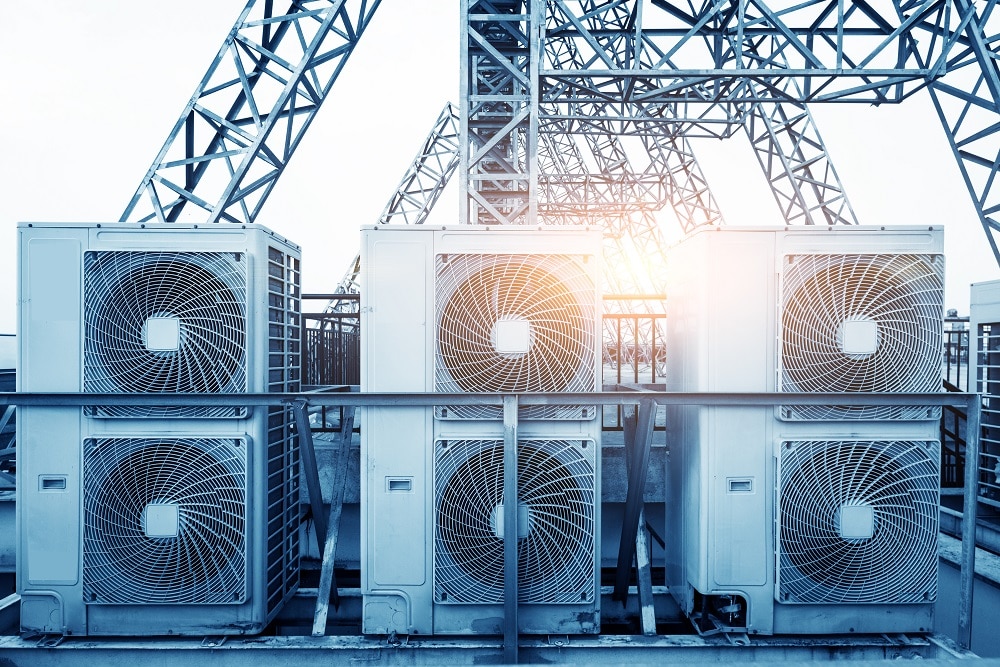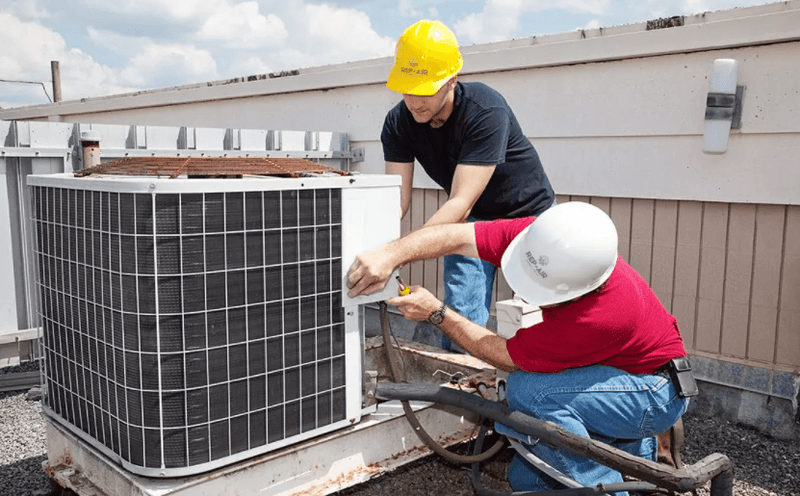Find out how HVAC experts provide reasonably priced air quality solutions
Checking Out the Necessary Elements of a Reliable A/c System
An effective cooling and heating system is built on several essential parts that function in consistency. Each part, from the thermostat to the ductwork, plays a necessary function in keeping convenience and power efficiency. Comprehending these components is critical for enhancing performance and boosting interior air quality. As one takes a look at these components, the complex relationships in between them reveal insights right into boosting general system efficiency. What specific aspects contribute most to this efficiency?
The Role of the Thermostat in Heating And Cooling Efficiency

Usually overlooked, the thermostat plays an important role in the efficiency of HVAC systems. This small tool works as the key control facility, controling temperature setups and ensuring suitable comfort within an area. By accurately noticing the ambient temperature level, the thermostat communicates with the air flow, air, and home heating conditioning devices to maintain the wanted environment
An effective thermostat reduces energy consumption by turning on the a/c system only when essential, consequently protecting against extreme heating or air conditioning. Modern programmable and smart thermostats boost this efficiency better by enabling individuals to establish timetables and from another location change setups, adjusting to daily routines.
Furthermore, the positioning of the thermostat is crucial; inappropriate place can bring about imprecise temperature readings, causing ineffective operation. Overall, a well-functioning thermostat not only enhances comfort however also contributes noticeably to energy financial savings and the durability of the cooling and heating system.
Understanding the Value of Air Filters
Air filters offer a necessary feature in heating and cooling systems by assuring that the air distributing within a space remains healthy and clean. These filters trap dirt, allergens, and various other pollutants, stopping them from being recirculated throughout the environment. By capturing these particles, air filters contribute to enhanced interior air high quality, which can substantially profit owners' health, specifically those with allergic reactions or breathing problems.
Additionally, keeping clean air filters enhances the effectiveness of a/c systems. Clogged filters can restrict air flow, creating the system to work harder to maintain desired temperature levels, resulting in enhanced power consumption and greater utility expenses. Consistently replacing or cleaning filters is an essential upkeep step that can lengthen the lifespan of cooling and heating tools. Inevitably, recognizing the value of air filters enables home owners and building supervisors to take aggressive measures to guarantee a well-functioning, effective heating and cooling system that promotes a comfortable and secure interior setting.

The Performance of the Heater and Warm Pump
Furnaces and heatpump are crucial components of heating and cooling systems, liable for giving heat throughout cooler months. Furnaces operate by home heating air with combustion or electrical resistance, then distributing it throughout the home through ducts. They commonly provide fast home heating and can be fueled by gas, electricity, or oil, depending upon the system type.
Alternatively, heatpump move warm instead of produce it. They extract warm from the outside air or ground, even in reduced temperature levels, and move it inside. HVAC experts. This twin capability allows heatpump to likewise give cooling in warmer months, making them versatile alternatives for year-round environment control
Both systems call for proper maintenance to guarantee performance and longevity. While heating systems master severe chilly, warmth pumps can be beneficial in moderate environments. Understanding their distinct capabilities help homeowners in selecting one of the most suitable option for their home heating needs.
Exploring the Air Conditioning Device
The cooling device is an essential element of a/c systems, offered in numerous kinds to match different needs. Recognizing the performance scores of these units is vital for making educated selections about energy consumption and price. This section will discover the diverse types of air conditioning system and make clear just how efficiency ratings impact efficiency.
Kinds Of Air Conditioners
While various factors affect the choice of air conditioning systems, recognizing the various types readily available is essential for homeowners and building supervisors alike. Central air conditioning conditioners are made to cool down entire homes or structures, using a network of air ducts for airflow. Home window units supply a more local remedy, ideal for little rooms more info or single areas. Mobile air conditioners provide flexibility, enabling customers to relocate the device as required. Ductless mini-split systems are one more option, integrating the efficiency of central systems with the convenience of zoning, as they call for no ductwork. Geothermal systems harness the planet's temperature level for energy-efficient air conditioning. Each kind features distinct benefits, making informed selections vital for effective climate control.

Performance Ratings Described
Comprehending performance scores is vital for choosing the appropriate air conditioning unit, as these metrics provide understanding into the system's performance and energy intake. The most typical ranking for ac unit is the Seasonal Power Performance Ratio (SEER), which gauges the cooling outcome during a common cooling season divided by the complete electrical power input. A greater SEER indicates better effectiveness. Additionally, the Power Effectiveness Ratio (EER) is used for measuring efficiency under details conditions. An additional crucial metric is the Energy Star qualification, which symbolizes that a system satisfies rigorous energy effectiveness guidelines. By assessing these scores, customers can make informed selections that not just maximize comfort however likewise decrease power expenses and environmental impact.
The Relevance of Ductwork and Airflow
Effective ductwork style and airflow administration play vital functions in the general efficiency and performance of heating and cooling systems. Proper ductwork warranties that conditioned air is dispersed equally throughout a room, reducing temperature level changes and improving comfort. Well-designed ducts lessen resistance to airflow, reducing the workload on HVAC devices and ultimately reducing power usage.
Airflow monitoring entails purposefully putting vents and registers to enhance the circulation of air. This prevents common concerns such as warm or cold spots, which can occur when airflow is blocked or improperly balanced. Additionally, the appropriate air duct products and insulation can further improve effectiveness by reducing warmth loss or gain during air transportation.
An efficient ductwork system not only contributes to power financial savings however can also lengthen the life-span of heating and cooling tools by lowering unneeded strain (HVAC experts). Consequently, understanding the importance of ductwork and airflow is crucial for attaining peak a/c system efficiency
Normal Maintenance Practices to Improve Efficiency
Normal maintenance techniques are vital for guaranteeing peak performance of HVAC systems. These techniques consist of routine assessments, cleaning, and needed repairs to maintain the system running effectively. Routinely transforming air filters is important, as clogged up filters can block air flow and minimize efficiency. In enhancement, service technicians must examine and clean evaporator and condenser coils to stop overheating and power wastefulness.
Annual professional examinations are also advised, as trained specialists can recognize possible concerns prior to they escalate. Lubing relocating components minimizes wear and tear, contributing to a much longer lifespan for the system. Moreover, ensuring that the thermostat works properly aids in keeping excellent temperature control.

Regularly Asked Concerns
Exactly how Typically Should I Change My Thermostat?
Thermostats ought to normally be replaced every 5 to ten years, relying on usage and modern technology improvements. Normal checks are suggested to ensure peak performance, specifically if experiencing irregular temperature level control or enhanced energy expenses.
What Dimension Air Filter Is Ideal for My A/c System?
The finest dimension air filter for a HVAC system differs by device design. Commonly, it's important to speak with the proprietor's handbook or inspect the existing filter dimensions to assure peak performance and air quality.
Can I Mount a Warmth Pump Myself?
Installing a heatpump independently is feasible for knowledgeable people, but it needs understanding of neighborhood codes and electric systems. Working with an expert is advised to guarantee appropriate setup and excellent system efficiency.
Just how Do I Know if My Ductwork Is Effective?
To figure out ductwork efficiency, one ought to look for leaks, action air flow at vents, check insulation top quality, and assess temperature level distinctions in between supply and return air ducts. Expert analyses can offer extensive understandings right into total performance.
What Are Indications My HVAC Demands Immediate Upkeep?
Signs that a HVAC system needs instant maintenance include uncommon noises, inconsistent temperatures, enhanced power costs, unpleasant smells, and regular cycling. Addressing these problems immediately can protect against further damage and guarantee height system performance.
Air filters offer an essential feature in Heating and cooling systems by ensuring that the air flowing within a room continues to be tidy and healthy and balanced. Furthermore, maintaining clean air filters boosts the efficiency of HVAC systems. Ductless mini-split systems are an additional option, integrating the effectiveness of central systems with the ease of zoning, as they require no ductwork. Comprehending effectiveness rankings is vital for picking the right air conditioning system, as these metrics give understanding right into the system's efficiency and power consumption. The best dimension air filter for a Heating and cooling system varies by device style.